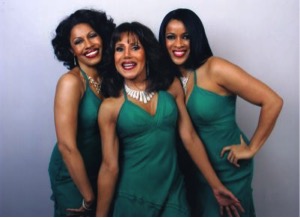“Jerry Blavat got our first record ‘Oh Yeah, Maybe Baby,’ because he was a disc jockey at the time, and listened to it. Then he flipped it over. Jerry later said to me that, ‘If Phil Spector had a set of ears, he would have known that the flip — ‘There’s No Other (Like My Baby)’ — was the hit side, and that’s the one I played.’ And Jerry was right; it was a hit.”
It was 1961: a time when deejays could spin the records that grabbed them, and help make a young singer or singing group an overnight star.
It was also a time when five teenagers from Brooklyn — Dolores “Dee Dee” Kenniebrew, Barbara Alston, Mary Thomas, Myrna Girard, and Patricia Wright — played out their own version of this street corner-to-stage dream story.
The youngest, at 15, was Dee Dee and still had two more years of high school. Unlike many groups of the era, the girls didn’t go to the same school. Still, it was through a school that they came together.
“Our first manager was Barbara Alston’s uncle Benny Wells,” says Dee Dee. “He had played sax in big bands, and he lived near the school where my mom worked. He wanted to put together a female singing group and asked my mom if she knew any teenage girls. She said, ‘Well, I have a daughter who likes to sing. I’ll bring her in and you can listen to her.’”
“Benny had heard that his niece Barbara had a group and she brought in Myrna and Mary, and he put me with them. I was the high voice.”
“We were doing songs that were already out by The Bobettes and The Shirelles and like that, and then Benny said that we needed to have some original material. He knew a guy who lived in East New York named Leroy Bates. Leroy was married to Pat Wright’s sister. Pat was there when we went to Leroy’s house, and Benny said, ‘Why don’t we make it a quintet?’ and added Pat.”
“Leroy had a little four-year-old daughter named Crystal and we named ourselves after her. ‘The Crystals’ was youthful but it was also sophisticated.”
“Benny was giving us a lot of five part harmonies on things like ‘Green Dolphin Street.’ Very jazzy rather than just your regular four chord rock ’n’ roll.”
“After about a year, he had about five original songs and took us over to the Brill Building (New York City’s hub of teen pop songwriters) and started knocking on doors. One night we were there rehearsing about seven o’clock and this little guy walked into the room. He said, ‘Could you sing the songs again?’ So we did and he said, ‘This one right here: can you slow it down and sing it as a ballad?’ It was called ‘He’s Alright.’”
“In the chorus was ‘There’s no other like my baby/No, no, no, no/He’s alright, he’s alright, he’s alright.’ He said, ‘Drop he’s alright and keep the other part.’ We found out later that his name was Phil Spector.”
“Benny knew that Phil had just done ‘Spanish Harlem’ for Ben E. King, and was very excited. We went into the studio in May. Myrna, Mary, and Barbara came straight to the session from their prom in their dresses. We recorded two sides and never thought anymore about it.”
“I was surprised when I heard ‘There’s No Other’ on the radio. I came home from school one afternoon and put on the radio and there it was.” The record broke on the West Coast in mid-October, was picked up by New York Top 40 stations in November, and peaked in the Top 20 nationally as 1962 dawned. On the R&B chart it went all the way to #5.
“By November,” says Dee Dee, “they were calling us to come play the Apollo. I had never even seen a live show and now we’re going to be onstage with The Coasters! We had to run out and buy clothes and shoes. We weren’t even green, yet, we were still yellow. I was too dumb to be afraid!”
“When we got on the stage, we realized that something was awfully wrong. I don’t know why they didn’t boo us. When we got off, we cried. What was wrong was the guy who had written our music charts had copied it in the wrong key. So Reuben Phillips, who had the main house band at the Apollo, took these five little girls downstairs to the band room, and transposed our music for us.”
“Now we needed to do another song so Phil gave us a contract to sign. It was awful. We had no rights. No choice of what we sang. Nothing!”
“We did ‘Uptown’ at Mira Sound. [Unlike our first session] there were no musicians there. You just put the cans (headphones) on and you heard the basics, the rhythm section, and sang your parts.” There was also another difference between their first and second sessions. “Recording ‘There’s No Other’ was very, very easy. In, out, done! But [for ‘Uptown’] he went over and over it. We were in there doing vocals for almost a week!”
By now the quintet included Delores “LaLa” Brooks. “Myrna got married and left the group,” says Dee Dee. “So we brought in a girl who was in junior high school who had a very strong voice. She [was brought on] just for the [NY DJ] Murray the K [Christmas] Show, but we kept her.”
‘Uptown’ was a solid hit, peaking at #10 on the Cash Box Top 100, even though, according to Dee Dee, “None of us liked it. We wanted to do something like ‘Please Mr. Postman,’ more of an R&B-type song, but Phil didn’t give a heck what you liked.”
The Crystals now had two hits under their belts but no money. “We were very disgruntled,” says Dee Dee.
“Phil brought us ‘Chains’ which The Cookies wound up doing. And he brought us ‘It’s My Party’ but [when we heard it] it was a ballad. We started it, but never finished it.”
“When he brought us ‘He’s A Rebel,’ he had Barbara on the lead and she has a soft voice. Barbara didn’t want to do leads, and LaLa had been doing most of the leads in our shows. We were really pushing for him to use LaLa but, nope, he wanted to go with Barbara [even though] that song called for a heavier voice. We had rehearsed ‘He’s A Rebel’ and then we went on the road where we heard the new song by The Crystals. We looked at each other like, ‘What?’ We could not believe it.”
Unbeknownst to The Crystals, Spector had moved his operation to California where he hired Darlene Love and The Blossoms to record “He’s A Rebel.” Their next single ‘He’s Sure The Boy I Love’ was also done by Love and company. Both were smash hits: #1 and #11 on Billboard’s Hot 100 respectively, with ‘Rebel’ also reaching #2 on the R&B list.
Next up: “Da Doo Ron Ron (When He Walked Me Home).” Says Dee Dee, “I think Phil did record that with [Darlene and The Blossoms] as well, but it worked better with LaLa’s voice. LaLa flew to California to put the lead vocal on ‘Da Doo Ron Ron,’ and then he called us. We were at the Howard Theater in Washington, D.C. so we took a shuttle from D.C. to Regent Sound Studios on 57th Street in New York, put the background vocals on, and got back to the Howard in time for the three o’clock show.”
“We all liked ‘Da Doo Ron Ron’ right out of the chute because from bar one it hit you with that Bam! It was really exciting.” Fans agreed. It soared into the Top 5, followed by the Top 10 ‘Then He Kissed Me.’
Despite their hit streak, The Crystals wanted out. “We said, ‘We’ve got to get away from this guy.’ We had gotten no pay for any of our songs: none.” Two more singles appeared on Philles Records: “Little Boy” and “All Grown Up.” Both barely scraped into the Hot 100.
‘Boy’ debuted the same week in February 1964 that “I Want To Hold Your Hand” reached #1. The music it was a changin’ and, as Dee Dee notes, “If you weren’t from Britain, you didn’t get played.”
“By that time Mary was gone, Pat was gone, Barbara was gone,” says Dee Dee. Two more Crystals singles appeared on United Artists, and then a final 45 by “Barbara, Dee Dee and Mary” on Michelle Records.
After some reunion shows involving various combinations of Crystals, Dee Dee was left to carry on their legacy. “There was no problem with anyone,” she says, “I just took the jobs and kept it going.”
Dee Dee says she has “great fans” and those on the Malt Shop Memories cruise can expect a very special show: Girls Night Out presented by Night Owl Entertainment, featuring Shirley Alston Reeves, The Crystals, and The Chiffons. “We’ll all be on stage at the same time. We’re going to reminisce about old times and sing songs from some of our favorite acts. We’re going to have video footage. It’s going to be a whole production,” and a fitting tribute to some terrific singers and their timeless music.
- Ed Osborne © 2016
 Dolores “Dee Dee” Kenniebrew of The Crystals, in center
Dolores “Dee Dee” Kenniebrew of The Crystals, in center